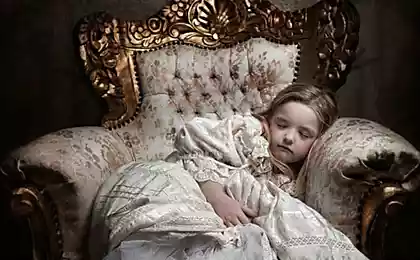722
Rich and poor children
Despite the obvious mind pattern of relationships, when the "poor" are in a less enviable position than "the rich", the situation is not always so straightforward. Is that the "poor" are stigmatized among more affluent classmates, and sometimes that "the rich" become the object of persecution by their peers.
Before talking about the problem, as such, you need to deal with those who are "poor" and "rich". Specific figures of income of parents here is not an indicator. An important role plays the ratio of income of families of the children. If in one group the student is positioned as "rich", in another school it may be among the "poor school". But this is not the main criterion.

It is very important that it is in the children's team is perceived as wealth and prosperity. Naturally, children are not aware of the "payment" of parents and the balance of their Bank accounts. Children and adolescents understand the wealth in the measurement of the number of prestigious things and gadgets owned by the peers; their ability to change the items, following the latest trends; as well as the facts visit resorts in other countries and clubs.
In fact, all these pleasures of life to their children are not only parents with high income. Families with middle and low income are sometimes willing to allocate the lion's share of their income that the child "was not worse than others" and he had the "right friends".
In turn, not all rich parents "fork" on the luxurious life of his child. Have achieved a lot thanks to the hard work and perseverance of the mother and father is often expected from the child of the same approach to life and a very negative attitude towards the ease and sweet of the existence of his offspring. First, get a job, and then decide whether you need to put your money into the wind. Thus, in the understanding of "wealth" and "poverty" is very much subjective. In the "rich" can get children with low family income and poor children to be wealthy, but demanding parents.
But all it gadgets and fashionable clothes? Of course not. The attributes of social identity in the eyes of children. And behind them stretch the other nuances of understanding who is who. Currently, the stereotypes about the diligence, the skill and advancement of the rich versus narrow-mindedness, laziness and ineptitude of the poor, is increasingly widespread in society. In addition there is a stereotype that the poor are just more honest and decent, while the rich crooks and thieves.
Sometimes for peers, children from families with a low income becomes an object of ridicule. If you are poor, you are lazy and stupid. And your family is. And if so, it means that you are worthy of censure and contempt.
In turn, children from families with high incomes can also get into a similar situation. After all, a child in the eyes of his peers he did not deserve, and only uses the achievements of Papa and Mama. The only reason he has a lot of what the other is unavailable. And it's not fair. He is lazy and uses "all ready". Yes, and how you can get rich in our time? Only to steal and cheat other people. So you're a lazy child thieves and fraudsters. For this reason, you are worthy of censure and contempt.
But it was in Russian history, the time when people were in terms of wealth is relatively equal. Then perestroika came and some people got rich, others were poor. So, after all, not all people are the same. Some have abilities that others do not have them. Despite the fact that some of today's rich made their situation is not quite legitimate and quite illegally, studies show that the difference in understanding the life of "the rich" and "poor" do exist.
Fair poor
People with low income see the world and what is happening with them with different eyes and probably this world leave traces on their decisions and behavior in life.
So, they believe that:
In addition, according to unofficial estimates, about 80% of the rich and the stars of business are immigrants from an environment with low income. Perhaps this is a subjective assessment on the prevalence of the former among the poor millionaires, but many of the great corporations once began almost one cent, and sometimes with a huge debt to the Bank.
In another study were shown a relatively high conformity among people with low education and lower income. They tend to choose things on the same level as other people from their circle and settle for less. At the same time people with high incomes and education prefer to have unique things and achieve more.
However, "poor" more empathic, more time and energy to spend on the maintenance of other, easier to share with others who need help. They are more focused on moral dogma and rules.
Indifferent rich
"Rich people" less inclined to sympathy for others, often do not accept "universal values" (it can assume that unethical behavior is possible, "if you want to do" or success in life allows you to break the rules and sometimes laws). People of "higher class" worse recognize emotions, pay less attention to people with whom you communicate.
Of course, after such information is to recognize "the rich" unambiguous villains and the "world" evil is quite logical.
And yet they ascribe to malice. However, a psychologist from UC Berkeley Paul PIFF believes that this process is more likely associated with the fact that the poor are more in need of the interconnection and support of people around me. The rich are more free and independent, and therefore the support of others did not really need them. Although, in fact, their habit in building relations is not too good. Like in Hollywood movies, lost opportunities and wealth, the former millionaire may be all alone.
Complain
These common psychological characteristics of rich and poor are not alien to children of wealthy parents and parents with low income. They are the picture of the world and the scheme of human relations, which are transmitted and shown to their mother and father.
Who are the people with different income and how to treat them? This is a lazy fools or the rich and cunning thieves? What to do with it? How people should behave within their class and against the people of another class? To require other people to take care of yourself, have a happy life, just because you and your family low income? To expect worship and obedience, because you belong to the "highest" class, which means you have all the positive qualities by default? Or build your own destiny, not looking at the class relationship issues?
The answers to these questions are often given exactly the parents and shown to the family. And they do not depend directly on the income of the family, and what kind of values the family supports. What the adults in their environment consider poverty and wealth, and the range of acceptable behavior to their peers from other groups. For example, is it possible and approved by the violence towards opponents. Surprisingly, there are parents who not only not condemn, but support the shenanigans of their children in relation to their peers from other social groups.
However, it is impossible to say that the hooliganism and bullying in relation to the peers are unique to "the poor" or only "the rich." They are characteristic of insecure kids who need recognition and raise self-esteem. In this position, it may be the child of any class, when his parents for any reason, valid or not valid, is not enough time for him.
"Five cents" teachers
Great importance in the formation of relations of the type "class hatred" in a group of children playing teachers. In some cases, the teacher deliberately better applies to "rich", because their parents might become sponsors for school. For this reason, teacher at best turns a blind eye to the antics of the kids of rich parents, and sometimes openly supports and justifies them in the event of serious breaches of discipline. The same situation develops in the case of persecution of children from more wealthy families, when the teacher just does not want to "contact" or pities the "poor".
But there is a different situation, when the teacher, in contrast, prevents the stratification of a group of children. There are children, despite the disparate financial situation of the families coexist peacefully and not fixed in communication on who and what the opportunity is, the way you dress, and how they spend their leisure time. All these things remain outside of the school. And a lot of such examples.
In fact, all of the above suggests that many of the differences between rich and poor children are vague and subjective and can be adjusted by parents and teachers. To eliminate the bias to class-origin peers must be approached with full seriousness. Because every child and the "rich" and "poor" may be subject to prosecution.

The right start
Children from rich and poor families have a different start in life. On average, children from families with low incomes have less access to various educational resources. Later in the school years, parents are often forced to deny their children any cultural trips, holidays, visits, because the family can not afford to do so. They don't subscribe to popular magazines, don't buy new gadgets, don't have "cool" toys, computers, etc.
Despite all the efforts of parents and teachers, the child of such parents will be clear that it is limited in scope. Yes, of course, parents can say that all the magazines, gadgets, toys and beautiful clothes is utter nonsense and the main thing that "the person was good". In addition, people are different and all have different abilities and "that's life". However, some children remain unsatisfied with that situation.
Benefit from any position
On the one hand this dissatisfaction can cause depression, lead to blame and anger. On the other hand, it can become a motivation for improvement and empowerment. And the potential parents is not a sin to use it. This should be done, not spreading hatred of those who have more money or opportunities, and guiding the child to acquire skills that can provide him a greater ability to Express themselves and to achieve the desired.
It is helpful to instill in your child the habit to compare yourself less with others and more with myself in the past. Only then will really see how much he has progressed in life and learning and what opportunities are received. Show him the value of those or other signs of wealth. Fashion items after some time become irrelevant, and the skills remain. The money runs out, and the knowledge of how to earn them always with you.
Promoting education as such, and continuing education in adulthood in the family is one of the highlights. Knowledge is always necessary to refresh and replenish, and it is never enough. And this propaganda is necessary at the level of their parents demonstration of this approach to life, not the cuffs.
Parents should also look at yourself, what thoughts, what stereotypes and the vision of life they give the child in respect of wealth or poverty. Whether their picture of the world of fatalism and the life of the impasse. This can affect the child in such a way that it won't even try to do something in life.
It is necessary to Orient the child to build strong friendships with other people. The ability to find common language and compromise – very important help for its good adaptation to life current and in the future. These skills will reduce the risk of "fall down" in a serious conflict with others.
And simple – the wealth of others does not mean anything in a relationship. Not wealth as such, but the reaction to it of children is important in the development of the conflict on the basis of financial capabilities of their parents. In fact, the pursuit of different kinds of aggression and violence against child is not of the social circle is based on the uncertainty of aggressor and victim, as with any other conflict of this kind.
However, parents often feel guilty that the child have something to give less, were born there, missed some opportunities. They think that the situation is really hopeless, because they are in a more disadvantageous position from which nothing can be done.
In fact, they often convey their self-worth to children, which gives them feelings of inadequacy and powerlessness in life. From this conflict situation in the school is perceived more sharply and seems a greater injustice than if the child was teased for big ears or a raised weight.
Parent CODE — read for ALL parents!
Teach children to dream and not to be afraid of...
So the work on the problem of "rich" and "poor" must be addressed not only at the child level, but also at the level of the family and leaders of a group of children. Of course, the best result is achievable when working together these three parties. But, unfortunately, it is not so easy to achieve.published
Author: Natalia Stilson
Source: letidor.livejournal.com/228621.html#cutid1
Before talking about the problem, as such, you need to deal with those who are "poor" and "rich". Specific figures of income of parents here is not an indicator. An important role plays the ratio of income of families of the children. If in one group the student is positioned as "rich", in another school it may be among the "poor school". But this is not the main criterion.

It is very important that it is in the children's team is perceived as wealth and prosperity. Naturally, children are not aware of the "payment" of parents and the balance of their Bank accounts. Children and adolescents understand the wealth in the measurement of the number of prestigious things and gadgets owned by the peers; their ability to change the items, following the latest trends; as well as the facts visit resorts in other countries and clubs.
In fact, all these pleasures of life to their children are not only parents with high income. Families with middle and low income are sometimes willing to allocate the lion's share of their income that the child "was not worse than others" and he had the "right friends".
In turn, not all rich parents "fork" on the luxurious life of his child. Have achieved a lot thanks to the hard work and perseverance of the mother and father is often expected from the child of the same approach to life and a very negative attitude towards the ease and sweet of the existence of his offspring. First, get a job, and then decide whether you need to put your money into the wind. Thus, in the understanding of "wealth" and "poverty" is very much subjective. In the "rich" can get children with low family income and poor children to be wealthy, but demanding parents.
But all it gadgets and fashionable clothes? Of course not. The attributes of social identity in the eyes of children. And behind them stretch the other nuances of understanding who is who. Currently, the stereotypes about the diligence, the skill and advancement of the rich versus narrow-mindedness, laziness and ineptitude of the poor, is increasingly widespread in society. In addition there is a stereotype that the poor are just more honest and decent, while the rich crooks and thieves.
Sometimes for peers, children from families with a low income becomes an object of ridicule. If you are poor, you are lazy and stupid. And your family is. And if so, it means that you are worthy of censure and contempt.
In turn, children from families with high incomes can also get into a similar situation. After all, a child in the eyes of his peers he did not deserve, and only uses the achievements of Papa and Mama. The only reason he has a lot of what the other is unavailable. And it's not fair. He is lazy and uses "all ready". Yes, and how you can get rich in our time? Only to steal and cheat other people. So you're a lazy child thieves and fraudsters. For this reason, you are worthy of censure and contempt.
But it was in Russian history, the time when people were in terms of wealth is relatively equal. Then perestroika came and some people got rich, others were poor. So, after all, not all people are the same. Some have abilities that others do not have them. Despite the fact that some of today's rich made their situation is not quite legitimate and quite illegally, studies show that the difference in understanding the life of "the rich" and "poor" do exist.
Fair poor
People with low income see the world and what is happening with them with different eyes and probably this world leave traces on their decisions and behavior in life.
So, they believe that:
- the fate they are given such life and it does not change. They have such character, capacity, etc.;
- they are often blamed for their position other thieves, businessmen, bad bosses, the bureaucrats and the government and demanding action on the "oschastlivlivaya" and improve their financial position;
- feel small under the weight of all problems and are making little effort to solve them;
- believe it is unacceptable to present yourself in the best light, talk about its virtues and demonstrate them;
- they focus on working time and the level of his salary and I think that is the only way to get the money. And, therefore, the source of wealth comes down to the idea of "work harder";
- the fear of losing all or even a small part of the accumulated or available stops them from improving their situation;
- they refuse to additional education or change the profession, because "too late", "undignified again to go to learn at this age" and use of any other explanation.
In addition, according to unofficial estimates, about 80% of the rich and the stars of business are immigrants from an environment with low income. Perhaps this is a subjective assessment on the prevalence of the former among the poor millionaires, but many of the great corporations once began almost one cent, and sometimes with a huge debt to the Bank.
In another study were shown a relatively high conformity among people with low education and lower income. They tend to choose things on the same level as other people from their circle and settle for less. At the same time people with high incomes and education prefer to have unique things and achieve more.
However, "poor" more empathic, more time and energy to spend on the maintenance of other, easier to share with others who need help. They are more focused on moral dogma and rules.
Indifferent rich
"Rich people" less inclined to sympathy for others, often do not accept "universal values" (it can assume that unethical behavior is possible, "if you want to do" or success in life allows you to break the rules and sometimes laws). People of "higher class" worse recognize emotions, pay less attention to people with whom you communicate.
Of course, after such information is to recognize "the rich" unambiguous villains and the "world" evil is quite logical.
And yet they ascribe to malice. However, a psychologist from UC Berkeley Paul PIFF believes that this process is more likely associated with the fact that the poor are more in need of the interconnection and support of people around me. The rich are more free and independent, and therefore the support of others did not really need them. Although, in fact, their habit in building relations is not too good. Like in Hollywood movies, lost opportunities and wealth, the former millionaire may be all alone.
Complain
These common psychological characteristics of rich and poor are not alien to children of wealthy parents and parents with low income. They are the picture of the world and the scheme of human relations, which are transmitted and shown to their mother and father.
Who are the people with different income and how to treat them? This is a lazy fools or the rich and cunning thieves? What to do with it? How people should behave within their class and against the people of another class? To require other people to take care of yourself, have a happy life, just because you and your family low income? To expect worship and obedience, because you belong to the "highest" class, which means you have all the positive qualities by default? Or build your own destiny, not looking at the class relationship issues?
The answers to these questions are often given exactly the parents and shown to the family. And they do not depend directly on the income of the family, and what kind of values the family supports. What the adults in their environment consider poverty and wealth, and the range of acceptable behavior to their peers from other groups. For example, is it possible and approved by the violence towards opponents. Surprisingly, there are parents who not only not condemn, but support the shenanigans of their children in relation to their peers from other social groups.
However, it is impossible to say that the hooliganism and bullying in relation to the peers are unique to "the poor" or only "the rich." They are characteristic of insecure kids who need recognition and raise self-esteem. In this position, it may be the child of any class, when his parents for any reason, valid or not valid, is not enough time for him.
"Five cents" teachers
Great importance in the formation of relations of the type "class hatred" in a group of children playing teachers. In some cases, the teacher deliberately better applies to "rich", because their parents might become sponsors for school. For this reason, teacher at best turns a blind eye to the antics of the kids of rich parents, and sometimes openly supports and justifies them in the event of serious breaches of discipline. The same situation develops in the case of persecution of children from more wealthy families, when the teacher just does not want to "contact" or pities the "poor".
But there is a different situation, when the teacher, in contrast, prevents the stratification of a group of children. There are children, despite the disparate financial situation of the families coexist peacefully and not fixed in communication on who and what the opportunity is, the way you dress, and how they spend their leisure time. All these things remain outside of the school. And a lot of such examples.
In fact, all of the above suggests that many of the differences between rich and poor children are vague and subjective and can be adjusted by parents and teachers. To eliminate the bias to class-origin peers must be approached with full seriousness. Because every child and the "rich" and "poor" may be subject to prosecution.

The right start
Children from rich and poor families have a different start in life. On average, children from families with low incomes have less access to various educational resources. Later in the school years, parents are often forced to deny their children any cultural trips, holidays, visits, because the family can not afford to do so. They don't subscribe to popular magazines, don't buy new gadgets, don't have "cool" toys, computers, etc.
Despite all the efforts of parents and teachers, the child of such parents will be clear that it is limited in scope. Yes, of course, parents can say that all the magazines, gadgets, toys and beautiful clothes is utter nonsense and the main thing that "the person was good". In addition, people are different and all have different abilities and "that's life". However, some children remain unsatisfied with that situation.
Benefit from any position
On the one hand this dissatisfaction can cause depression, lead to blame and anger. On the other hand, it can become a motivation for improvement and empowerment. And the potential parents is not a sin to use it. This should be done, not spreading hatred of those who have more money or opportunities, and guiding the child to acquire skills that can provide him a greater ability to Express themselves and to achieve the desired.
It is helpful to instill in your child the habit to compare yourself less with others and more with myself in the past. Only then will really see how much he has progressed in life and learning and what opportunities are received. Show him the value of those or other signs of wealth. Fashion items after some time become irrelevant, and the skills remain. The money runs out, and the knowledge of how to earn them always with you.
Promoting education as such, and continuing education in adulthood in the family is one of the highlights. Knowledge is always necessary to refresh and replenish, and it is never enough. And this propaganda is necessary at the level of their parents demonstration of this approach to life, not the cuffs.
Parents should also look at yourself, what thoughts, what stereotypes and the vision of life they give the child in respect of wealth or poverty. Whether their picture of the world of fatalism and the life of the impasse. This can affect the child in such a way that it won't even try to do something in life.
It is necessary to Orient the child to build strong friendships with other people. The ability to find common language and compromise – very important help for its good adaptation to life current and in the future. These skills will reduce the risk of "fall down" in a serious conflict with others.
And simple – the wealth of others does not mean anything in a relationship. Not wealth as such, but the reaction to it of children is important in the development of the conflict on the basis of financial capabilities of their parents. In fact, the pursuit of different kinds of aggression and violence against child is not of the social circle is based on the uncertainty of aggressor and victim, as with any other conflict of this kind.
However, parents often feel guilty that the child have something to give less, were born there, missed some opportunities. They think that the situation is really hopeless, because they are in a more disadvantageous position from which nothing can be done.
In fact, they often convey their self-worth to children, which gives them feelings of inadequacy and powerlessness in life. From this conflict situation in the school is perceived more sharply and seems a greater injustice than if the child was teased for big ears or a raised weight.
Parent CODE — read for ALL parents!
Teach children to dream and not to be afraid of...
So the work on the problem of "rich" and "poor" must be addressed not only at the child level, but also at the level of the family and leaders of a group of children. Of course, the best result is achievable when working together these three parties. But, unfortunately, it is not so easy to achieve.published
Author: Natalia Stilson
Source: letidor.livejournal.com/228621.html#cutid1























